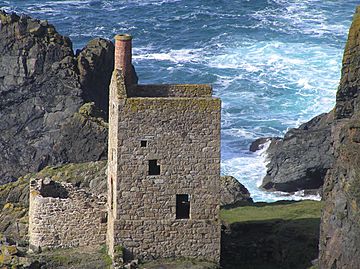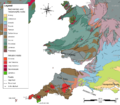Cornwall and West Devon Mining Landscape facts for kids
| UNESCO World Heritage Site | |
|---|---|

Part of Crown Mines, Botallack (St Just Mining District)
|
|
| Location | Cornwall and West Devon, United Kingdom |
| Criteria | Cultural: (ii), (iii), (iv) |
| Inscription | 2006 (30th Session) |
| Area | 19,719 ha (48,730 acres) |
The Cornwall and West Devon Mining Landscape is a special place recognized as a World Heritage Site. This means it's important for everyone in the world to protect and enjoy. It includes many old mining areas in Cornwall and West Devon in the United Kingdom.
This site was added to the World Heritage list in July 2006. Later, some plans to restart mining and build a supermarket made people wonder if its special status was at risk. In 2014, there was a discussion about putting the site on a list of "World Heritage in Danger." However, this idea was rejected. Instead, experts decided to keep a close eye on the site to make sure it stays protected.
Contents
A Look Back: Mining History
For a long time, Devon produced less tin than Cornwall. Up until the mid-1500s, Devon made about a quarter to two-fifths of the tin that Cornwall did. But the total amount of tin from both areas was quite small back then.
After the 1540s, Cornwall's tin production grew much faster. Devon's production became only about a tenth of Cornwall's. This meant that the mining areas in Devon, called Devon Stannaries, didn't bring in much money for the King anymore.
During the 1700s and 1800s, the landscapes of Cornwall and West Devon changed a lot because of mining. They mined a lot of copper and tin. There were underground mines, special buildings called engine houses (which held steam engines to pump water out of mines), and places where metal was melted and shaped (foundries).
New towns and small farms also grew around the mines. Ports and harbours were built to ship the mined materials. All these things together helped the region produce two-thirds of the world's copper supply!
Later, in the late 1800s, the eastern parts of Cornwall and West Devon started producing arsenic. This region ended up supplying half of the world's arsenic at that time.
Special Mining Areas
The World Heritage site is made up of many different areas. Each area is important, and they are all connected by their mining history. These areas are spread across Cornwall and West Devon.
Here are some of the main areas that are part of the World Heritage Site:
- St Just Mining District
- Port of Hayle
- Tregonning and Gwinear Mining District
- Trewavas
- Wendron Mining District
- Camborne and Redruth Mining District
- Wheal Peevor
- Portreath Harbour
- Gwennap Mining District
- Devoran and Perran Foundry
- Kennall Vale
- St Agnes Mining District
- Luxulyan Valley
- Charlestown
- Caradon Mining District
- Tamar Valley
- Tavistock
Rocks Full of Riches
The rocks in Devon and Cornwall were once deep inside huge ancient mountains. These rocks naturally contain more heavy metals than most other rocks on Earth's surface. This is why the area was so rich in minerals like tin and copper.
Recently, a new mineral was even found in Cornwall. It was named Kernowite, after Kernow, the Cornish name for Cornwall!
Related pages
Images for kids
-
Geevor Tin Mine near St Just, Cornwall
-
Levant Mine in St Just Mining District
See also
 In Spanish: Paisaje minero de Cornualles y el oeste de Devon para niños
In Spanish: Paisaje minero de Cornualles y el oeste de Devon para niños
 | Precious Adams |
 | Lauren Anderson |
 | Janet Collins |




